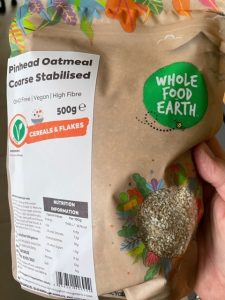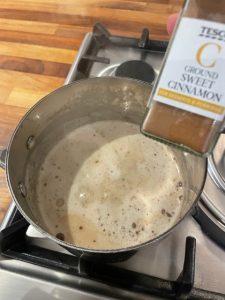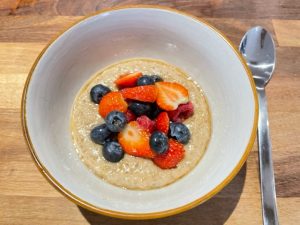Oats Nutrition | Best Ways to Enjoy Superfood
Discover how to get your oats nutrition and enjoy this superfood. Explore delicious recipes and tips for incorporating oats into your diet.
Oats are such a versatile grain, they are a staple of many of our diet and it’s the way lots of us like to start our day, but what are their super powers and which oats are best for you? are oats good for you? Let’s take a deeper dive into one of the world’s most important cereal crops and find out which style of oat will be best for you, especially if you are trying to lose weight or prevent that middle aged spread!
Oats contain phenolic compounds that possess a high level of antioxidants concentrated in the outer layer of the kernel in the bran fraction of the oat grain provide nutritional benefits that have attracted attention from researchers worldwide and resulted in increased interest in the food industry. Therefore we should be getting our oats in their most unprocessed state as close to their harvested form as possible to reap the benefits from the “whole” grain.
Porridge oats contain Beta-glucans which are a polysaccharide that can increase immune defence by activating something called “complement system” enhancing macrophages and natural killer cell function. In fact, they are so effective they are even given post-op intravenously in some parts of the world to reduce risk of infection.
Cholesterol lowering powers
They have also been shown to be effective helping to lower cholesterol thereby supporting cardiovascular health.
When you eat beta-glucan, it forms a kind of gel which binds to cholesterol-rich bile acids in the intestines limiting the amount of cholesterol that is absorbed from the gut into your blood. This was demonstrated in a recent meta analysis: Consumption of 3 g of soluble fibre from 70g oats daily was sufficient to decrease blood cholesterol in this study, however, interestingly, it didn’t have the same effect on blood glucose levels” (1). More on this shortly but suffice to say, not all oats are equal when it comes to regulating blood glucose levels. On the other hand, for oats cholesterol-lowering properties specifically, you really want to aim for the bran part of the oat. Oat bran contains 7-10% beta-glucan compared to whole oats which contain 2.3-8.5% beta-glucan.
Fibre
Oats are a fantastic source of soluble fibre which feeds our gut bacteria keeping them flourishing (we must look after the little guys) and helps to regulate our blood sugar levels. Fibre is often the missing nutrients in many diets resulting in constipation and lower gut bacteria diversity; a known factor in the etiology of IBS and IBD (2). Fibre from oats help to sweep waste through our gastro-intestinal tract, helps increase gut motility by increasing bulk of faecal matter, supporting regular healthy bowel movements. Importantly, fibre helps to slow the rate at which glucose enters the blood which means more stable energy, mood, and satiety, leading to less cravings/snacking.
Oats nutrition for blood sugar management
Did you know that the latest statistics suggest that 1 in 3 adults in the UK are pre-diabetic and don’t know it?! (3) This is shocking and as a growing concern in the UK, we really need to do something about it. Making a small change by including oats in your breakfast is a great start to managing blood glucose levels, especially if you choose pinhead oats.
This can be measured using the the glycemic index (GI) which is a number from 0 to 100 assigned to a food, where pure glucose is given the value of 100, a score represents the relative rise in the blood glucose level two hours after consuming that food (4). Take instant oats for example has a GI score of 83 compared to that of rolled oats which come out at 55 and pinhead oats which are as low as 42. That is nearly half the GI of instant oats so you can see, if you are trying to better manage your blood glucose levels changing to pinhead oats is an excellent move.
Oats, groats, steel cut and pinhead
When it comes to choosing your oats, there are lots of options. The supermarket shelves are heaving when it comes to cereal choices so I can see how there is a lot of confusion over what to choose. When you compare an old fashioned style oat which still resembles an oat compared to crunchy, honey-nut oat flakes which is so far removed from its original form, there are some things you need to know to make an informed choice. Here is my low down on the different types available and which are best for you to choose:
Are instant oats good for nutrition
Nutritionally speaking, although they are super convenient because they are so quick to prepare, they have been processed and lost lots of the lovely fibre and nutrients that have been removed. This results in oats in their most simple carbohydrate form which breaks down into glucose in the blood stream very quickly. This can mean you feel hungry again just a short while later and can lead to snacking, further raising blood sugar levels driving one of the biggest health problems we have in the UK; prediabetes and diabetes type 2. Another additional problem with instant oats is all those flavoured options which can be laden with added sugar! Some of the flavoured brands can contain at least 3 to 4 teaspoons of added sugar per serving! My advice is to steer away from flavoured oats and those that have added milk powders and sugars.
Making a healthy bowl of oats from scratch doesn’t need to be laborious or time-consuming, especially when you can get ahead of your busy day by pre-soaking them and making overnight oats. Here is my low down on the various types of oats you will find in your local supermarket that I hope you find helpful.
Regular oats
These have still been processed but retain some of the fibre and nutritional benefits but are still quick to prepare and heat resulting in a smooth, creamy porridge. Delicious but with a lower fibre content and quicker digestion in the gut, these may not fill you up for long enough.
Rolled oats
These have been steamed and rolled and represent what most of us are most familiar with. These are great for baking, making overnight oats and for regular porridge. These make a great choice when you want oats with more benefits but don’t have the longer prep time.
Jumbo oats or Old-fashioned oats
This form of oatmeal are often labelled as “old fashioned oats” or sometimes as “jumbo oats”. These oats are slightly less processed than rolled oats and are more chewy and take a little longer to get to “porridge” consistency when heated with milk/water, but are a fab option for baking, cooking and overnight oats.
Pinhead oats, Groats or Steel-cut

Despite them being called a variety of names, they are all the same. These are in my opinion, the best form of oats to start your day. Steel cut oats are oats in their least processed form and have the lowest GI score because they are digested and absorbed slowly and do not raise blood sugar levels quickly.
Each oat has been cut into small pieces by a steel cutting machine resulting in the “pin head” oat hence the name/s. They are also sometimes called groats or may be labelled steel-cut. They contain the most nutrients and unmatched fibre content. Because of this, they take a little longer to prepare although soaking overnight can speed this up if you are short on time in the morning. However, I simply add a cup to a pan, add 3 cups of liquid (I used 2 cups oat milk/1 cup water), a sprinkle of cinnamon and bring to the boil, reduce to simmer for 10 minutes and I find the texture at this point to be just right, but you might like to cook a little longer for a softer bite. It is a matter of trying different cooking times to see what you enjoy most. The slightly nutty, chewy texture of pinhead oats is delicious, and they wonderful thing is how satisfying they are, they really can keep you full until lunchtime.

Less Snacking, More Satisfaction

Pinhead oats can keep you full for longer resulting in less snacking which is one of the biggest problems we have in the UK as confirmed by Professor Tim Spector founder of Zoe health app and author of recent bestseller Food for Life in my recent chance meeting where I got the opportunity to ask him “If you could pass on one piece of advice that would solve the majority of the UK health problems, what would it be” to my excitement he answered with two key foundation steps of my Eat Better Feel Better programme; “Avoid ultra-processed foods and stop snacking”!
Free Recipes
You can find healthy oats nutrition recipes on my recipe page and even arrange a chat or one to one consultation with me for a personalised health plan fully supported with recipes to help you whatever your health goals whether to lose weight, manage your blood sugar levels, improve your digestion and gut health, balance your hormones and improve mood, contact me.
I look forward to chatting with you soon
Evie Nutrition
Nutritional Therapist Gut Health Specialist – Discover My Heathly Eating Services

Prof. Tim Spector and me – chance encounter Oct 22! lucky me.
References
(1) Gulati et all, 2017
(2) https://pubmed.ncbi.nlm.nih.gov/30026921/
(3) https://doi.org/10.1136/bmj.g3791
(4) https://www.diabetes.org.uk/guide-to-diabetes/enjoy-food/carbohydrates-and-diabetes/glycaemic-index-and-diabetes

